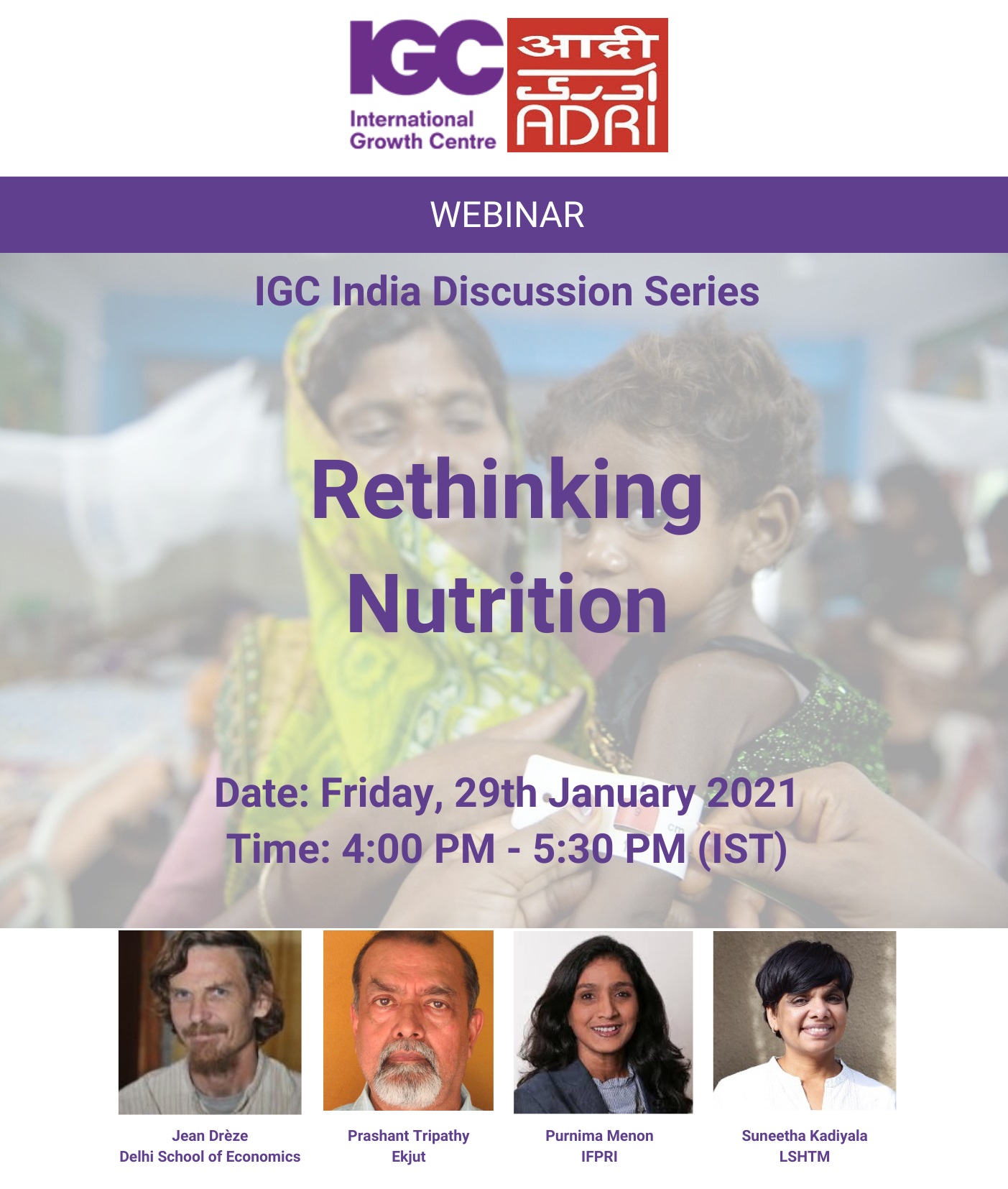Events of IGC

Title: Rethinking Nutrition - Serious Concerns and Urgent Action
Panellists: Jean Drèze (Delhi School of Economics), Prasanta Tripathy (Ekjut), Purnima Menon (International Food Policy Research Institute), Suneetha Kadiyala (London School of Hygiene & Tropical Medicine) and Senior Government Officials (NITI Aayog and MWCD - TBC)
Date and Time: 29th January 2021 at 16.00 to 17.30 (IST)
Zoom Link for Registration: Registration Link
Brief: The recent release of NFHS 5 data by the Government of India has highlighted the growing concern around malnutrition in India; with most states showing a trend of worsening in child nutrition indicators such as childhood stunting, wasting and underweight. As per the NFHS 5 data, between the time period 2015-16 and 2019-20, in seven out of ten states the proportion of underweight children has increased and in six of these ten states stunting has increased. Furthermore, the Global Hunger Index (2020) ranks India at 94 out of 107 countries. The concerns around child nutrition are multi-fold and tackling malnutrition will require collective efforts and understanding the political economy around food.
Thereby, it becomes all the more important to create a space for having the necessary dialogues to understand further and envision a way forward to address the current challenges around malnutrition. To stimulate thoughts on this important issue within the context of India, International Growth Centre of London School of Economics and Asian Development Research Institute will organise a Webinar on “Rethinking Nutrition” to build an understanding over a range of targeted initiatives for tackling malnutrition on January 29th 2021 from 16.00 – 17.30 (IST).
Patna, 29 January. The International Growth Centre (IGC) and Asian Development Research Institute (ADRI) organised a webinar titled, ‘Rethinking Nutrition’ on 29th January 2021. The panel was moderated by Suneetha Kadiyala (London School of Hygiene & Tropical Medicine) and event panellists were Arjan De Wagt (UNICEF), Jean Drèze (Delhi School of Economics and Ranchi University), Prasanta Tripathy (Ekjut), Purnima Menon (International Food Policy Research Institute).
The concerns around child nutrition are multi-fold and tackling malnutrition will require collective effort and understanding the political economy around food. The recent release of NFHS-5 data by the Government of India has highlighted the growing concern around nutrition in India. Furthermore, the Global Hunger Index (2020) ranks India at 94 out of 107 countries.
Prasanta Tripathy stated on NFHS data that while quoting from Dr Purnima Menon's blog, it is like a fire alarm & this fire is coming from many sources. He highlighted the distributional aspects which are important to understand who benefited and who did not. He further added that focus on creches, home visits, counselling have shown results. He shared the necessity of community-based programmes to address the challenges of malnutrition.
Jean Drèze stated that budget cuts during the last NFHS-4 round in 2015-16 have impacted the children’s program, this has impacted service delivery and staffs' salary. And Poshan Abhiyan is just a drop in the ocean. He further stated we need to get away from the over focus on Rice & Wheat and need to include Dal in the PDS & it has been done last year in 2020 during the COVID19 lockdown & this would be a good thing even later & if we can continue this diversification of other foods in the PDS. The provisions of eggs during mid-day meals which are still not being given to the children in many states. We know for a fact that including eggs in the national policy will be beneficial for the children.
Arjan De Wagt stated that seasonality is a huge factor in understanding of stunting, seasonality for several other indicators e.g. diarrhoea, possibly anaemia, possibly underweight. Don't get stuck with data. Think of the larger picture. There is a lot of data about the situation of children and about different programs reaching or not reaching. What is required now is to collectively repackage the programme and start proper implementation in the current designs and programmes instead of reinventing with out of box ideas. It is time to get in the box and improve the quality of the implementation & ensure to reach everyone since it is not about just reaching the 80% but also those remaining 20% who were left out because they need it the most.
Purnima Menon said when we look at the data we tried to understand all the key aspects together to improve child nutrition - stunting, underweight, anaemia, wasting and not in isolation, next we tried to analyse the drivers of these outcomes and then we tried to understand the interventions that is there to address these drivers to improve outcome. On financing nutrition, she stated that the current budget analysis is focused on nutrition specific interventions, but it is a good time to widen the circle since children grow in families & we should see the family as a whole. A child friendly budget should include the parents of the child as well.
Suneetha Kadiyala said that as the saying goes it takes a village to raise a child, we should take this thought forward for our next budget on children and improving nutrition.
Dr. Ashmita Gupta from ADRI gave the Vote of thanks.